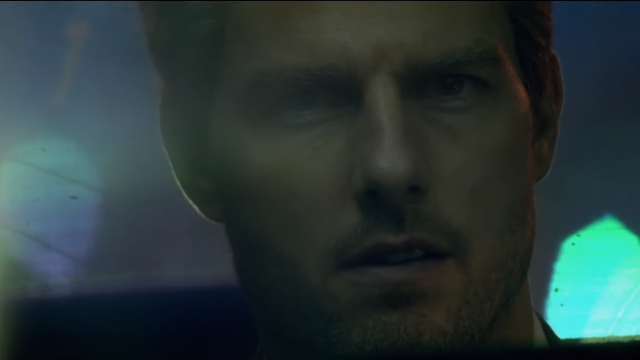My taste for relentlessly plotted genre works is well known around these parts, but a side effect of never slowing down the plot is that if you do it exactly once, whatever effect you’re chasing is enhanced and underlined by its own existence. Michael Mann’s main inspiration for directing Collateral was that it felt like the third act of another movie – a minimal setup and then two hours of powerful forward movement. Vincent (Tom Cruise) is an assassin who takes taxi driver Max (Jamie Foxx) hostage, forcing him to drive the killer around so he can pull off his hits. Late in the film, after the two fall silent, coyotes run out on the road, forcing Max to stop so they can pass. Describing the action isn’t enough to convey the effect. Before it happens, the pulsating music drops out, an almost literally heartstopping moment. We see Max react to something and stop the car, and Vincent looks around in confusion before seeing: a coyote, eyes glowing from the limited light and digital cameras, running across the road in front of the car. Vincent is confused and curious, and he watches a second coyote cross, it eyeing him and us warily, and the opening notes of Audioslave’s “Shadow On The Sun” kick in. Max and Vincent watch it go, with Max being less confused, presumably seeing Los Angeles’ coyotes all the time.
Some have interpreted this as a commentary on Vincent’s sociopathy, with his reaction being confusion as to why Max didn’t just plow his way through these animals. Others interpret it as Vincent seeing and recognising another predator. I prefer to read it as a rebuttal to Vincent’s belief in the all-consuming control of his world. The scene’s existence was a moment of serendipity – Mann happened to see coyotes crossing the road and got his crew to use their newfangled digital cameras (capable of filming in much lower light than film) to capture their image. This is a movie in part about LA and cities in general, and as much as he complains about how disconnected people are in them, Vincent can do what he does because they’re a place of order and routine – routine he can manipulate in order to kill people. The intrusion of nature is a reminder that chaos can interrupt at any time, and Vincent can’t seem to recognise that. If he had, perhaps the movie would have ended differently. However you take it, the power of the moment comes down to the fact that it comes from nowhere and goes nowhere; our minds force us to try and explain what we’re seeing and feeling. Vincent is clearly feeling something when he looks at that coyote.
What are your favourite moments of a relentlessly plotted story suddenly slowing down?


